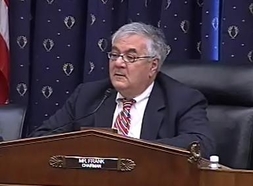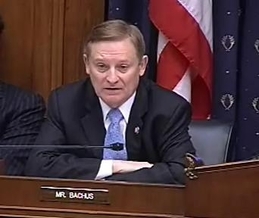






After Hearing, Frank’s Poker Bill Nears Mark-up and VoteInformational Hearing Features Some Heated Discussion, Colorful Analogies |
|
|

Rep. Spencer Bacchus (R-AL) compared poker players to heroin addicts, poker pro Annie Duke compared the opposition’s argument to the mindset of a tyrannical China or Iran, and two witnesses on the panel likened the notion of allowing current poker sites to operate in a newly regulated system to allowing drug cartels from Mexico or Columbia to be entrusted with the American drug industry if narcotics were ever legalized.
There was a lot of debate and little agreement in Wednesday’s informational hearing on HR 2267, the Internet Gambling Regulation, Consumer Protection, and Enforcement Act. The House Financial Services committee, which the bill’s author Frank chairs, held the hearing, which featured testimony from Duke on behalf of the Poker Players Alliance, Lynn Malerba of the Mohegan Tribe, Ed Williams on behalf of the Credit Union National Association, Tom Malkasian of California’s Commerce Casino, and Michael Fagan, a law enforcement consultant.
In the biggest news development that came out of the meeting, Rep. John Campbell (R-CA) said he would propose an amendment that included a stop-loss to address concerns that a player could lose more than he or she could afford. It is unclear whether that stop-loss provision would be optional or required; if it is the latter, more than a few high-stakes players are sure to be upset with the final product.
Of the panelists, Duke, Malerba, and Williams all spoke out generally in favor of Frank’s bill. Fagan and Malkasian, whose casino is leading the efforts in California to legalize intrastate online poker, spoke out against the bill.
“The legislation is fundamentally flawed and unsound,” said Malkasian, before noting that he was against a law that would “brazenly award foreign illegal operators.” Fagan also voiced that concern, while saying he believed an open market would present money laundering risks.

“The site self-regulated and refunded all the money to its customers. I would prefer to have something like HR 2267 so that the government could oversee that regulation. I think that the customers of that site were lucky that they were playing under a site with new management that behaved in an honest way and refunded them,” said Duke. “The one individual who perpetrated the crime and breached the software has not been prosecuted because unfortunately there is no jurisdiction to do so.”
Another fiery moment came at the hands of Rep. Joe Baca (D-CA), who opposes Frank’s legislation. Baca claimed that Native American tribes would de facto be giving up their sovereignty if they agreed to a 2% tax to the federal government on online gambling profits. Malerba, who is set to become chief of the Mohegan tribe, strongly disagreed and told the Congressman that tribes pay plenty in taxes now to state governments and that she would love a 2 percent tax on something such as her tribe’s slot revenue, which is right now at about 25 percent.
A lot of the talk in the meeting was once again about age-verification methods to ensure underage citizens cannot access online gambling sites. After Bacchus asked Fagan if current age-verification methods were fool-proof, the former prosecutor answered, “The short answer is no.”
 Duke and other members rebutted by pointing out that various well-respected countries, including the UK, employ methods today that are arguably more effective than using an ID at a land-based casino.
Duke and other members rebutted by pointing out that various well-respected countries, including the UK, employ methods today that are arguably more effective than using an ID at a land-based casino.
Frank went one step further, saying the constant bringing up of a youth safeguard was more of a political ruse than anything else.
“You can protect children, but this is not a protection of children. This is a ban on all activity…The poor children here are being used here by the people who don’t like gambling,” said Frank, before giving his justification for the bill. “It is the death of freedom if you say that because some minority of adults will abuse something, you prohibit it.”
Frank (D-MA) is expected to bring the bill back to the committee for a mark-up and vote in the next couple of weeks. If he is able to get enough votes in committee, the legislation could then go to the full House of Representatives for consideration.
Watch the entire House Financial Services committee hearing online right now.
Notes
